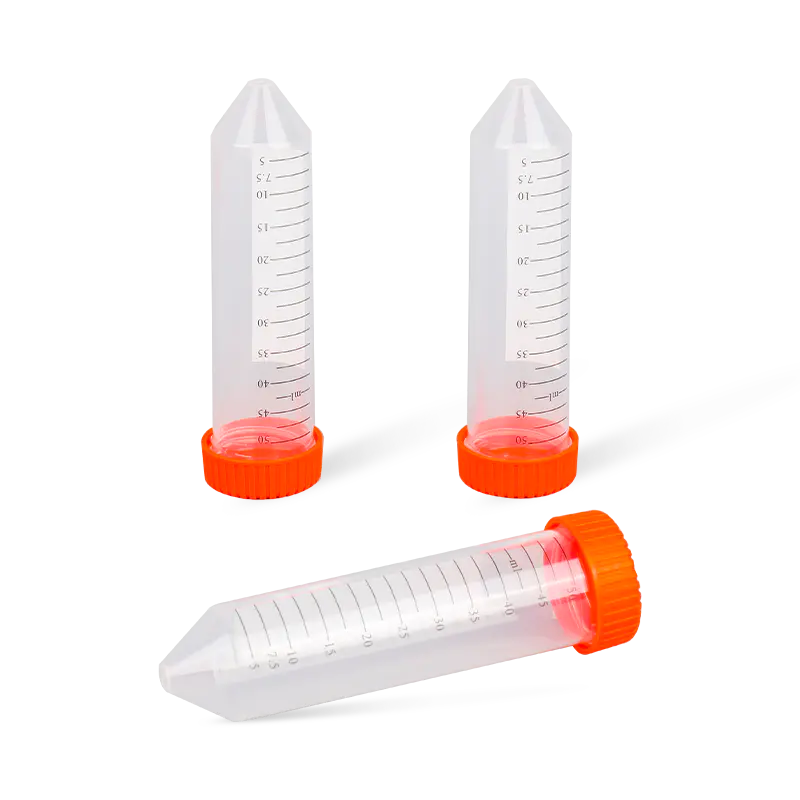In laboratory environments, the plastic centrifuge tube is a common and essential item used for separating substances based on density through centrifugation. These tubes provide a reliable container for samples during spinning processes that separate components such as cells, proteins, or nucleic acids. Due to their versatility, plastic centrifuge tubes are widely used in biological, chemical, and medical research.
A plastic centrifuge tube is typically made from polypropylene or other durable plastics that withstand high centrifugal forces without breaking or deforming. This durability is important because centrifuges operate at speeds that generate significant force, and tubes must maintain integrity to ensure safety and sample stability. The plastic construction also offers chemical resistance, which is valuable when working with various reagents or solvents.
The size of a plastic centrifuge tube varies depending on its intended application. Common volumes include 1.5 mL, 2 mL, 15 mL, and 50 mL. Smaller tubes are often used for microcentrifugation tasks, such as DNA extraction or enzyme assays, while larger tubes accommodate bulkier samples like blood or urine in clinical and research labs. Choosing the correct tube size ensures proper balance and efficient separation during centrifugation.
Another key feature of a plastic centrifuge tube is the secure cap or closure. Most tubes come with screw caps or snap caps designed to prevent leakage during high-speed spinning. The seal also protects samples from contamination and evaporation, preserving their quality for downstream analysis. Some caps include attached seals or O-rings to enhance their tightness, especially in demanding protocols.
Clear or translucent plastic is often preferred for centrifuge tubes because it allows visual inspection of the sample. This visibility helps lab technicians monitor the progress of separation and identify issues such as contamination or improper layering. Additionally, many plastic centrifuge tubes include graduation marks to measure sample volume accurately.
In laboratory workflows, the use of a plastic centrifuge tube contributes to process consistency and safety. These tubes are generally disposable, which reduces the risk of cross-contamination between samples. The availability of sterile options further supports work involving sensitive biological materials. Disposal after a single use also simplifies sample handling, eliminating the need for extensive cleaning and sterilization.
Handling and storage considerations are also important when working with plastic centrifuge tubes. Tubes should be compatible with the centrifuge rotor to avoid imbalance and damage. Furthermore, temperature resistance is a factor; many tubes are designed to tolerate freezing or heating conditions, allowing for sample preservation or incubation without transferring contents to other containers.
The range of applications for a plastic centrifuge tube extends beyond centrifugation. These tubes often serve as temporary storage vessels, mixing containers, or transport carriers within the laboratory. Their standard size and shape make them easy to organize and label, which improves sample tracking and workflow management.
When selecting a plastic centrifuge tube, factors such as chemical compatibility, volume capacity, and closure type should be considered. Ensuring that the tube meets the requirements of the specific protocol helps achieve reliable results and maintain laboratory efficiency. Manufacturers often provide detailed specifications to assist users in making informed choices.
The plastic centrifuge tube is a versatile and practical laboratory tool designed to support sample preparation and analysis. Its material properties, range of sizes, and secure closures contribute to its widespread use in scientific research and clinical testing. By understanding the features and applications of these tubes, laboratory personnel can enhance their experimental processes and maintain the quality of their work.
https://www.pipettetipfactory.com/product/plastic-centrifuge-tube/

